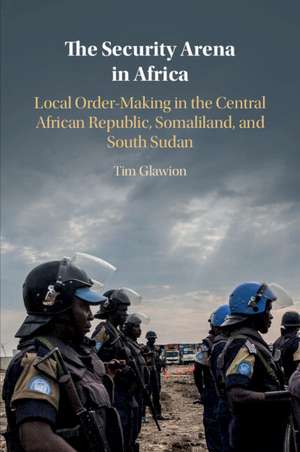The Security Arena in Africa: Local Order-Making in the Central African Republic, Somaliland, and South Sudan
Autor Tim Glawionen Limba Engleză Paperback – 23 mar 2022
| Toate formatele și edițiile | Preț | Express |
|---|---|---|
| Paperback (1) | 284.39 lei 6-8 săpt. | |
| Cambridge University Press – 23 mar 2022 | 284.39 lei 6-8 săpt. | |
| Hardback (1) | 695.06 lei 3-5 săpt. | |
| Cambridge University Press – 29 ian 2020 | 695.06 lei 3-5 săpt. |
Preț: 284.39 lei
Nou
Puncte Express: 427
Preț estimativ în valută:
54.42€ • 57.08$ • 45.30£
54.42€ • 57.08$ • 45.30£
Carte tipărită la comandă
Livrare economică 01-15 aprilie
Preluare comenzi: 021 569.72.76
Specificații
ISBN-13: 9781108737005
ISBN-10: 1108737005
Pagini: 274
Ilustrații: 16 b/w illus. 8 tables
Dimensiuni: 152 x 228 x 14 mm
Greutate: 0.37 kg
Ediția:Nouă
Editura: Cambridge University Press
Colecția Cambridge University Press
Locul publicării:Cambridge, United Kingdom
ISBN-10: 1108737005
Pagini: 274
Ilustrații: 16 b/w illus. 8 tables
Dimensiuni: 152 x 228 x 14 mm
Greutate: 0.37 kg
Ediția:Nouă
Editura: Cambridge University Press
Colecția Cambridge University Press
Locul publicării:Cambridge, United Kingdom
Cuprins
Introduction; 1. Ordering the security arena; 2. National and local histories of security; 3. Creating centres and peripheries in the national arena; 4. Inner and outer circles of the arena; 5. Stable ordering and predictable security; 6. Fluid ordering and flexible security; 7. Mixing ordering forms; 8. Embedding into and detaching from the arena; Conclusion.
Recenzii
'Based on impressive fieldwork, this book explores the dynamics of security and order at the sub-state level. It shows how local, national and international actors meddle, compete and complement one another in the security arenas found in small towns in Africa's conflict-affected countries, and what this means for the inhabitants' perceptions of security. It is essential reading for anyone interested in comparative security studies.' Alice Hills, University of Durham
'Concepts like state failure, security, and order are ubiquitous yet remain opaque. Tim Glawion lifts the hood to reveal tremendous variation ranging from state repression all the way to creative non-state security provision. By approaching security from the bottom up, he enriches our conceptual toolbox and contributes to our substantive understanding.' Stathis N. Kalyvas, University of Oxford
'One important feature of this book is that the discussions presented almost entirely rely on Glawion's direct engagement with everyday people whose security is often compromised. This bottom-up approach lends itself well to the topic at a time when most publications are a result of scholars' privileged macro-level discussions with state officials on security matters. This provides insight into the often neglected 'local cleavages'. The book also displays impressive field observations conducted over four years in nine locations within CAR, Somaliland and South Sudan. This relatively broad country coverage allows Glawion to examine why there is more security in some arenas than in others, despite sharing remarkably similar patterns of ordering. It is also important to note that these countries are not easily accessible in terms of field research. Finally, the book's structure and language allow for easy readership and engagement with the arguments presented throughout.' Philip O. Onguny, Africa: The Journal of the International African Institute
'… this is an extremely interesting and well-written book …' Ulf Engel, Connections
'The Security Arena in Africa is a refreshingly honest and contemplative work in terms of its voice. Glawion is candid and straightforward in his outlining of the methodological challenges and trade-offs faced in undertaking the fieldwork. Thus, he study represents, in this regard, a valuable contribution to the burgeoning literature on the politics and ethics of research in conflict-affected regions …' Jonathan Fisher, Perspectives on Politics
'Concepts like state failure, security, and order are ubiquitous yet remain opaque. Tim Glawion lifts the hood to reveal tremendous variation ranging from state repression all the way to creative non-state security provision. By approaching security from the bottom up, he enriches our conceptual toolbox and contributes to our substantive understanding.' Stathis N. Kalyvas, University of Oxford
'One important feature of this book is that the discussions presented almost entirely rely on Glawion's direct engagement with everyday people whose security is often compromised. This bottom-up approach lends itself well to the topic at a time when most publications are a result of scholars' privileged macro-level discussions with state officials on security matters. This provides insight into the often neglected 'local cleavages'. The book also displays impressive field observations conducted over four years in nine locations within CAR, Somaliland and South Sudan. This relatively broad country coverage allows Glawion to examine why there is more security in some arenas than in others, despite sharing remarkably similar patterns of ordering. It is also important to note that these countries are not easily accessible in terms of field research. Finally, the book's structure and language allow for easy readership and engagement with the arguments presented throughout.' Philip O. Onguny, Africa: The Journal of the International African Institute
'… this is an extremely interesting and well-written book …' Ulf Engel, Connections
'The Security Arena in Africa is a refreshingly honest and contemplative work in terms of its voice. Glawion is candid and straightforward in his outlining of the methodological challenges and trade-offs faced in undertaking the fieldwork. Thus, he study represents, in this regard, a valuable contribution to the burgeoning literature on the politics and ethics of research in conflict-affected regions …' Jonathan Fisher, Perspectives on Politics
Notă biografică
Descriere
Based on in-depth fieldwork, Tim Glawion explores how local security functions in some of the world's most fragile states across Central and East Africa.
